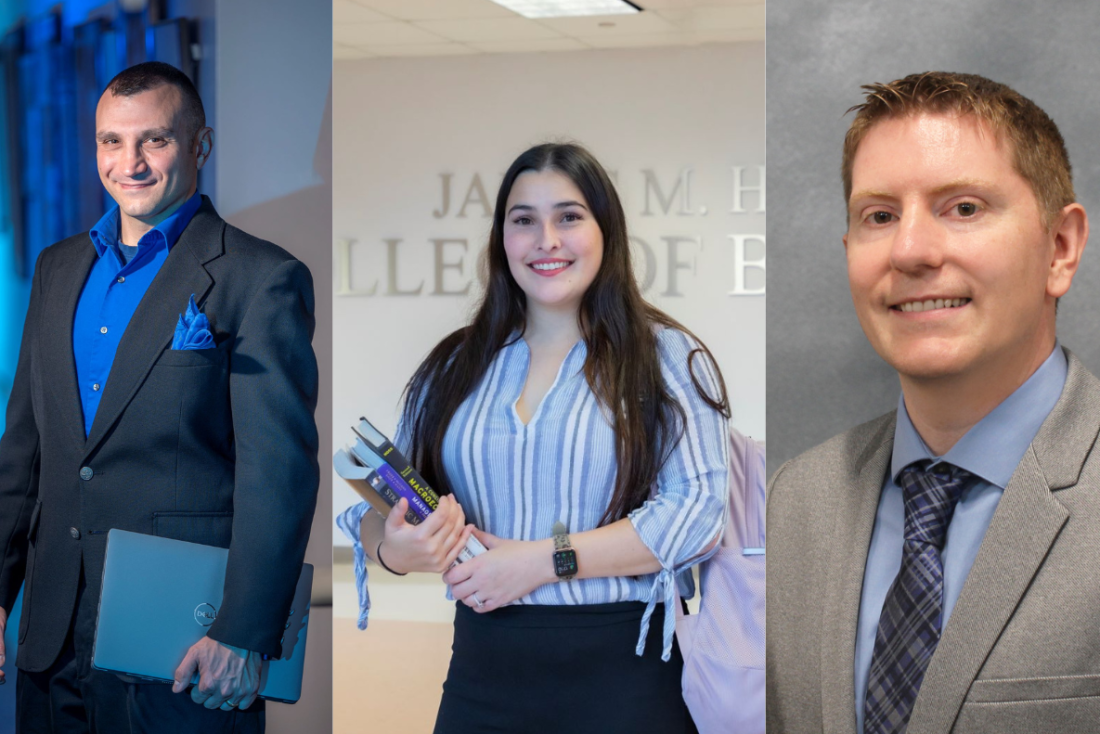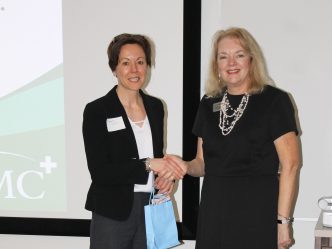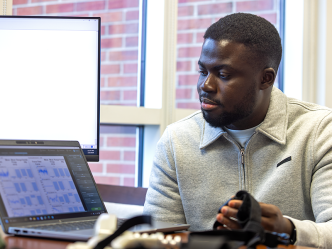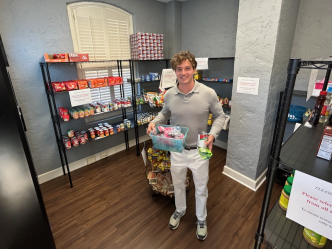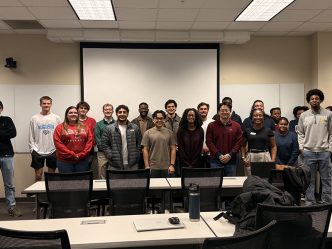The Master of Business Administration program at Augusta University is the hallmark graduate program of the Hull College of Business. A flexible program focused on supporting working professionals, MBA enrollment has increased 31% since fall 2016 — and the program has even more room to grow.
The program offers various tracks, including options for full-time students, part-time students and asynchronous online students. The program’s online offering, the Hull Online MBA, was recently ranked the most affordable online MBA in the nation, and is one of only seven MBA programs in the state included in the Georgia WebMBA initiative.
This flexibility and affordability coupled with prestige — the Hull MBA is accredited by AACSB International, a distinction earned by fewer than 5 percent of business schools worldwide — creates high demand for the program in the local community and beyond.
“Since the Augusta market has a large number of working professionals who desire an MBA degree to advance their careers, having the choice of affordable campus and online options allows them to choose the program that best fits their circumstances and allows them to keep working while getting their degrees,” said Rick Franza, PhD, dean of Hull College.
“As Augusta’s university and business school, AU and Hull are proud to provide high-quality, affordable, and accredited MBA programs for our working professionals.”
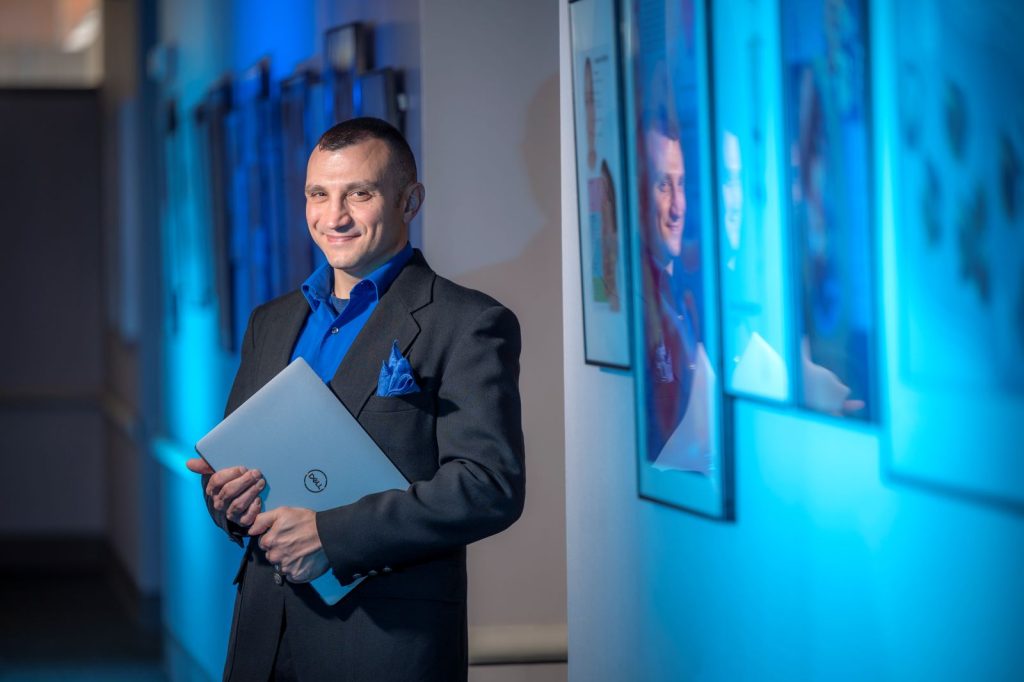
Alumnus John Rudenko, a recent Army veteran who graduated from AU with his MBA in August 2022, decided to pursue the program because of his passion for learning. He went into the MBA program with three degrees already, but wanted to try something new.
“At the time I’d reached a point in the Army where I felt like I was stagnating in my personal development. So the MBA was exactly what I needed when I needed it,” he said.
“It gave me that extra personal and professional development and growth spurt I needed to get through my last two years in the Army. It gave me something to focus on outside that I knew was going to matter and was going to benefit me even for years to come.”
One of his favorite aspects of the program was something he deemed the “cohort effect”: a peer closeness that results from students sharing classes with other students who started the program around the same time they did.
“Some classes it’s both cohorts combined, the full-time and part-time — some classes it’s just the part-timers — but the fact that you get to learn and grow and develop with the same group of people over time, you form a lot of really good relationships.”
Rudenko now works for a cybersecurity company, and said his MBA impressed his new employer.
“During my interview I was able to talk about things like ‘strategic positioning’ and ‘competitive advantage’ — things that, after the second question, they were just like ‘All right, we want to offer you this job.’”
The company plans to promote him to a role in finance or HR early next year as part of a veteran transition program.
“Having that MBA on my resume, it’s been golden — just the way people react when I tell them I have an MBA. To me, at the time, it wasn’t that big a deal, but I look back and it’s a big accomplishment.”
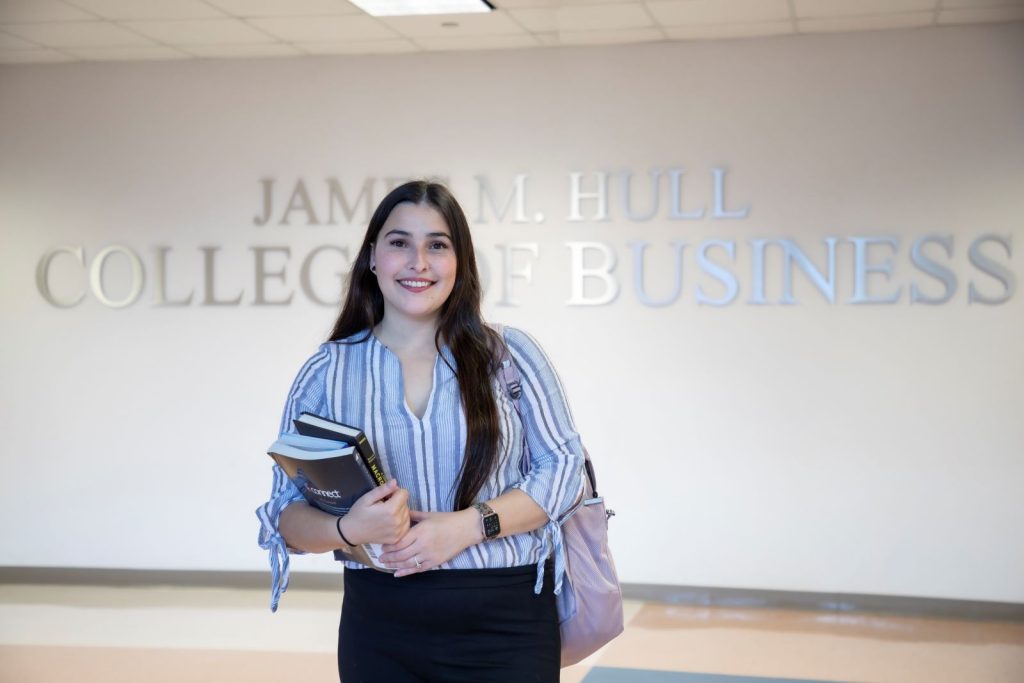
Amber De Los Santos, an MBA student set to graduate in December 2022, appreciated the program’s “cohort effect” as well.
“It was great to build those relationships with your fellow classmates. And I feel like it’s so much different being in a master’s program versus undergrad, because when we’re undergrad, we’re 18-21, we’re getting our footing, we don’t really have our career set in stone yet. We’re still kind of bouncing around jobs, doing retail or serving, bartending, things like that,” she said.
“But I feel like in the cohort we’re in, everybody’s so established, and networking was so helpful. I met so many different people within my cohort that have helped me outside of school.”
De Los Santos chose to pursue the program to advance her career as a government civilian. As a full-time employee at Fort Gordon, she opted for the part-time program, and credited her coursework and professors for helping her land a recent promotion.
After completing an Army civilian internship program in 2020 at the GS-9 level, she wanted to push her career further. She set her sights on a GS-11 position in spring 2022, and when a budget analyst role became available, she was interested — but didn’t feel confident enough to apply. That was until Melissa Furman, DBA, instructor of organizational behavior, convinced her to go for it.
“I had been applying for jobs and I wasn’t hearing much, but specifically in Dr. Furman’s class, she really deep-dove into self-growth, and that was so beneficial to me. The tools she was teaching about how to interview, how to present yourself, time management — those are just a few small things that I think really helped me to get the new position.”
Now, as a budget analyst working on busy accounts for Army public works and restoration management, the classes she took in her MBA are coming back to support her day-to-day work on the site: particularly her managerial finance course taught by Wendy Habegger, PhD. The class focused heavily on workbooks like Excel, which De Los Santos now uses daily.
“The class was very challenging, but she always pushed us to learn more, do better and do more formulas on spreadsheets and get comfortable with it. And I always thought ‘When is the next time I’m ever going to use a spreadsheet or these formulas?’ Then six months later, I got this new job and that was one of the things they interviewed me about. It’s so interesting to me that I get to use what I practiced before I even knew I would need it.”
Alumnus Jason Guilbeault, who completed his Hull MBA in June 2022, started the program hoping to broaden his perspective after 15 years working in research administration. He began the program part time while working as director of post-award services in the Division of Sponsored Programs Administration at Augusta University.
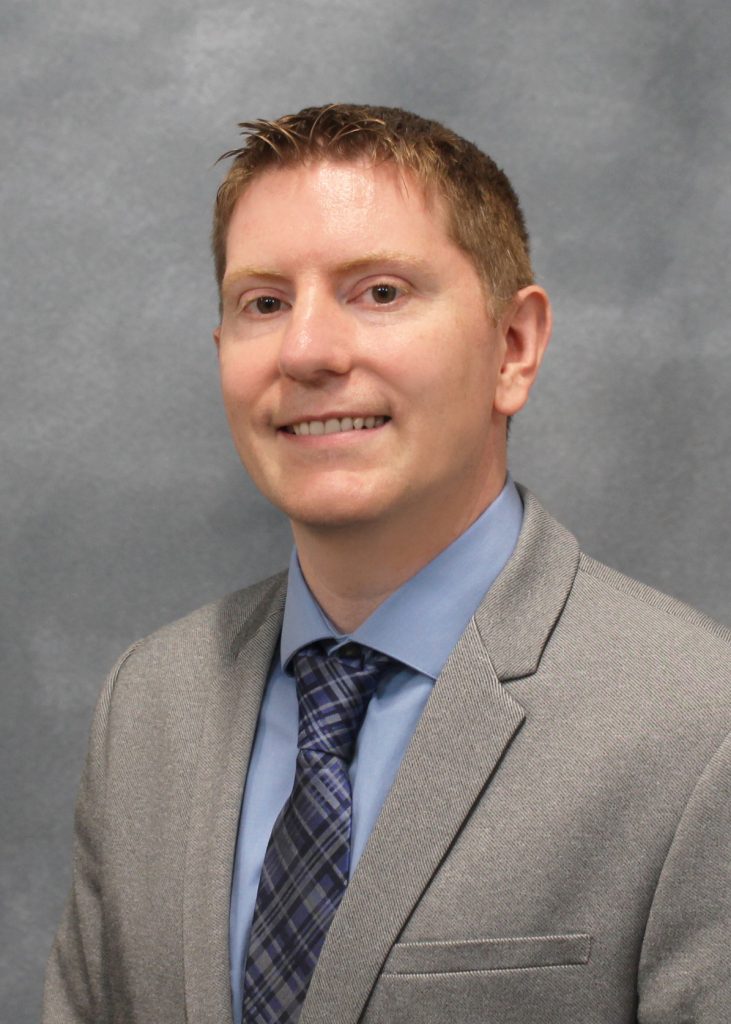
But as he closed out his MBA journey, a potential advancement opportunity emerged: He became eligible for the associate vice president position in his office, which had been vacant for over a year, despite several candidate interviews. Although he had served as the interim AVP for months, having a master’s degree was a requirement of the position, so at the time of the vacancy, he was ineligible to apply.
But when he completed his MBA coursework in June, he decided to put himself in the running, and after an extensive interview process, he was named AVP for the Division of Sponsored Programs Administration and executive director of the Augusta University Research Institute. He now supervises an office of 27 grant, contracting and accounting staff who support over $135 million annually in university funding.
An accountant by trade, the MBA program gave Guilbeault a broader understanding of organization management — a skill he would need more than ever as a new AVP.
“The skills you learn in your coursework during the MBA program give you a much broader perspective in making business decisions that have impacts across an entire enterprise. The knowledge and skills taught at Augusta University’s MBA program are truly needed for working at a higher level within a large organization,” he said.
And fortunately, the program was flexible enough to fit into his life, which is busy both at work and at home.
“My job gets really hectic here and I’m often pulled into meetings at the last second. But I thought the program was really great, and I thought from a time management perspective it was very doable. I consider myself to have a pretty heavy workload, and me and my wife have four kids, and I was still able to do it.”
Guilbeault also credited the program for helping him become a more empathetic leader.
“One of the things I’ve been guilty of in leadership is I tend to focus more on the work and the tasks and maybe not employee morale all the time. But I saw the value of being more involved in the culture within the office, and made an effort to do a little bit more in that regard — to have more conversations with people,” he said.
“I’m really renewing my focus on connecting better with the team, not just by tasks and projects, but in other ways as well.”
Rudenko and De Los Santos commended the program for its diversity — and for the amount they were able to learn not just from the faculty, but their peers as well.
“You have such a wealth of diversity within the peer group. I think just the people I’ve worked with directly includes a doctor, an engineer, another military member, an international student and one of AU’s athletes. There’s no end to the wealth of knowledge,” said Rudenko.
“One of my good classmates, she’s a mom who just opened her own business,” De Los Santos added.
That vast peer diversity made working in teams something to look forward to, Rudenko said.
“Once you got through the teacher covering the material and you got to work together, that was the best part — that teamwork that developed — and that’s how it’s going to be in business, right? That’s how it’s going to be when you’re working on a project or managing an initiative or trying to close a sale, you work in teams, so I loved that experience.”
The future of the Hull MBA is bright, according to Dean Franza. The college plans to introduce new tracks and concentrations for the MBA soon.
“Due to the density of health care professionals in the area, we are adding a health care management concentration for our campus MBA starting fall 2023,” said Franza.
 Augusta University
Augusta University
